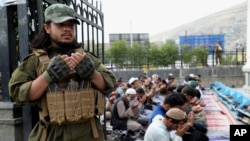The Taliban on Tuesday ordered the suspension of all Swedish activities in Afghanistan because of the public burning of the Quran, Islam's holy book, at a protest in Sweden last month.
The Swedish Foreign Ministry has also condemned the "Islamophobic" act, but it noted that Sweden has a "constitutionally protected right to freedom of assembly, expression and demonstration." The reaction came after the intergovernmental Organization of Islamic Cooperation stressed the need for taking steps to prevent future desecration of the Quran.
On June 28, an Iraqi national resident in Sweden's capital, Stockholm, tore and burned a copy of the Quran outside the largest mosque as Muslims celebrated Eid al-Adha worldwide. The incident sparked outrage and condemnation in Islamic countries.
"The Islamic Emirate suspends Sweden's activities in Afghanistan for granting permission to insult the Quran and the Muslim faith," the Taliban said, using the official name for their government in Kabul.
According to the statement, the order will remain effective "until they [Sweden] apologize to the Muslims for this heinous act." The Taliban called on other Islamic nations to "reconsider" their relations with the Swedish government over its "blasphemous" act.
The Quran burning incident in Sweden saw an immediate reaction from the Middle East and North Africa, with governments strongly condemning the act. Morocco recalled its ambassador from Stockholm.
A crowd of angry protesters in the Iraqi capital, Baghdad, quickly assembled at the Swedish Embassy and stormed its compound before being dispersed by security forces. Tens of thousands of people staged protest rallies across Pakistan last Friday.
Like other Western countries, Sweden closed its embassy in Afghanistan in August 2021 and evacuated all its staff, including Swedish and Afghan citizens, when the then-insurgent Taliban regained control of the country.
Aid workers said Tuesday's Taliban order would likely disrupt the humanitarian operations of the nongovernmental Swedish Committee for Afghanistan in the impoverished war-ravaged country.
The charity group manages development programs, including health care and education, in 18 provinces, employing about 8,000 Afghan employees.
The SCA said it was seeking dialogue with the de facto Afghan authorities to clarify if Tuesday's order also would affect their aid operations.
"SCA strongly condemns all acts of desecration of the Holy Quran, just as we condemn any attempt to create conflict or hostility between people based on religious belief, ethnicity, nationality or any other division," the group stated. "For over 40 years, SCA has been working in close collaboration with the rural population and in deep respect of both Islam and local traditions in Afghanistan."
Last year, SCA-run medical centers received 2.5 million patients in the Afghan provinces of Wardak and Nuristan. Its schools provided education to 133,000 children, and the organization supported more than 20,000 persons with disabilities, the statement noted.
Humanitarian operations in Afghanistan have already been under severe pressure after the Taliban banned the United Nations and other nongovernment organizations from hiring Afghan female workers. The Taliban have also barred girls from attending schools beyond the sixth grade and ordered most female government employees to stay home since seizing power nearly two years ago.
The restrictions on women's freedom to access education and work and a decline in donor funding have prompted the U.N. to cut its annual humanitarian aid plan for Afghanistan by more than $1 billion, forcing aid agencies to stop giving critical assistance to millions nationwide.





